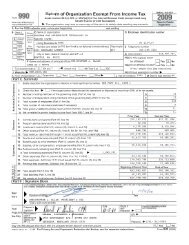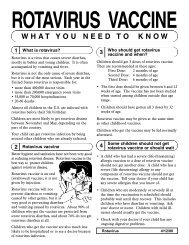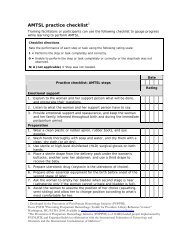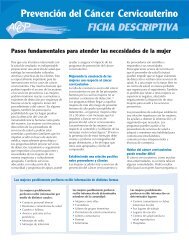Tuko Pamoja: A Guide for Peer Educators (entire - Path
Tuko Pamoja: A Guide for Peer Educators (entire - Path
Tuko Pamoja: A Guide for Peer Educators (entire - Path
Create successful ePaper yourself
Turn your PDF publications into a flip-book with our unique Google optimized e-Paper software.
Role play<br />
In role plays, group members use their imagination to create and act<br />
out characters, conversations, and stories. Role play is a way to talk<br />
about experiences, feelings, and beliefs in a safe environment. Anyone can<br />
participate in a role play – it does not require any special skill or talent. In role<br />
plays people act out a scenario in front of a group. Group members volunteer to act as a<br />
certain character. If a person is acting it does not mean that they are like that character. In<br />
fact, girls can play the roles of boys, students can play teachers, and young people can play<br />
elders. All we need is our imaginations. Role plays are not like dramas. They are not practiced<br />
be<strong>for</strong>e and they should not last <strong>for</strong> a long time. <strong>Peer</strong> educators should never comment on the<br />
quality of the role play but instead they should thank people who volunteer. Role plays are a<br />
good way to explore a problem or situation on a certain topic. For example, group members<br />
can play the roles of a teacher and a girl and the teacher is offering to give the student a<br />
better grade if she has sex with him. The person playing the girl can think of what she would<br />
do in that situation.<br />
Steps <strong>for</strong> a role play<br />
1. Read a situation to the group.<br />
2. Ask <strong>for</strong> volunteers to play the roles of the characters in the story in front of the other<br />
group members.<br />
3. Ask the volunteers to act out the situation.<br />
4. Ask group members to talk about the role play.<br />
• Do they agree with what the character decided to do?<br />
• Would they have done anything differently?<br />
5. Ask <strong>for</strong> another set of volunteers to act out the same situation.<br />
6. Talk about this role play and compare it to the one be<strong>for</strong>e.<br />
7. Summarize the actors’ decisions and lead a discussion about the role plays. Ask group<br />
members:<br />
• Is what happened similar to what would happen in real life?<br />
• How will the decisions the actors made influence their lives?<br />
• Who else could the actors have turned to <strong>for</strong> help or advice?

















